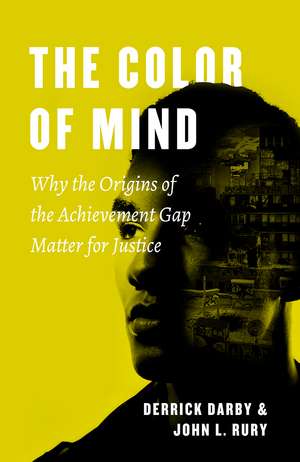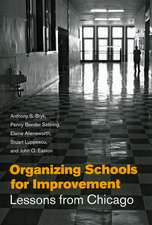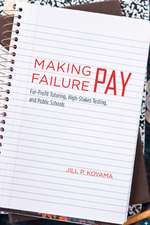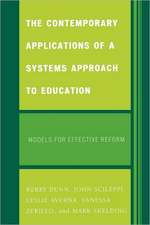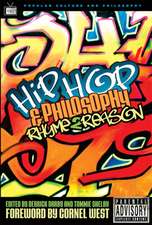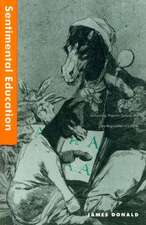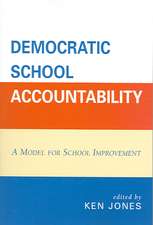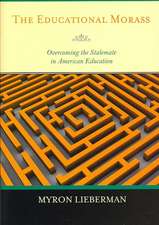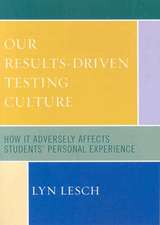The Color of Mind: Why the Origins of the Achievement Gap Matter for Justice: History and Philosophy of Education Series
Autor Derrick Darby, John L. Ruryen Limba Engleză Paperback – 24 ian 2018
American students vary in educational achievement, but white students in general typically have better test scores and grades than black students. Why is this the case, and what can school leaders do about it? In The Color of Mind, Derrick Darby and John L. Rury answer these pressing questions and show that we cannot make further progress in closing the achievement gap until we understand its racist origins.
Telling the story of what they call the Color of Mind—the idea that there are racial differences in intelligence, character, and behavior—they show how philosophers, such as David Hume and Immanuel Kant, and American statesman Thomas Jefferson, contributed to the construction of this pernicious idea, how it influenced the nature of schooling and student achievement, and how voices of dissent such as Frederick Douglass, Frances Ellen Watkins Harper, and W. E. B. Du Bois debunked the Color of Mind and worked to undo its adverse impacts.
Rejecting the view that racial differences in educational achievement are a product of innate or cultural differences, Darby and Rury uncover the historical interplay between ideas about race and American schooling, to show clearly that the racial achievement gap has been socially and institutionally constructed. School leaders striving to bring justice and dignity to American schools today must work to root out the systemic manifestations of these ideas within schools, while still doing what they can to mitigate the negative effects of poverty, segregation, inequality, and other external factors that adversely affect student achievement. While we cannot expect schools alone to solve these vexing social problems, we must demand that they address the dignitary injustices associated with how we track, discipline, and deal with special education that reinforce long-standing racist ideas. That is the only way to expel the Color of Mind from schools, close the racial achievement gap, and afford all children the dignity they deserve.
Telling the story of what they call the Color of Mind—the idea that there are racial differences in intelligence, character, and behavior—they show how philosophers, such as David Hume and Immanuel Kant, and American statesman Thomas Jefferson, contributed to the construction of this pernicious idea, how it influenced the nature of schooling and student achievement, and how voices of dissent such as Frederick Douglass, Frances Ellen Watkins Harper, and W. E. B. Du Bois debunked the Color of Mind and worked to undo its adverse impacts.
Rejecting the view that racial differences in educational achievement are a product of innate or cultural differences, Darby and Rury uncover the historical interplay between ideas about race and American schooling, to show clearly that the racial achievement gap has been socially and institutionally constructed. School leaders striving to bring justice and dignity to American schools today must work to root out the systemic manifestations of these ideas within schools, while still doing what they can to mitigate the negative effects of poverty, segregation, inequality, and other external factors that adversely affect student achievement. While we cannot expect schools alone to solve these vexing social problems, we must demand that they address the dignitary injustices associated with how we track, discipline, and deal with special education that reinforce long-standing racist ideas. That is the only way to expel the Color of Mind from schools, close the racial achievement gap, and afford all children the dignity they deserve.
Preț: 183.98 lei
Nou
Puncte Express: 276
Preț estimativ în valută:
35.21€ • 36.62$ • 29.07£
35.21€ • 36.62$ • 29.07£
Carte disponibilă
Livrare economică 24 martie-07 aprilie
Livrare express 07-13 martie pentru 21.33 lei
Preluare comenzi: 021 569.72.76
Specificații
ISBN-13: 9780226525358
ISBN-10: 022652535X
Pagini: 224
Ilustrații: 2 halftones, 3 tables
Dimensiuni: 152 x 229 x 18 mm
Greutate: 0.3 kg
Ediția:1
Editura: University of Chicago Press
Colecția University of Chicago Press
Seria History and Philosophy of Education Series
ISBN-10: 022652535X
Pagini: 224
Ilustrații: 2 halftones, 3 tables
Dimensiuni: 152 x 229 x 18 mm
Greutate: 0.3 kg
Ediția:1
Editura: University of Chicago Press
Colecția University of Chicago Press
Seria History and Philosophy of Education Series
Notă biografică
Derrick Darby is professor of philosophy at the University of Michigan. He is the author of Rights, Race, and Recognition, and coeditor, with Tommie Shelby, of Hip Hop and Philosophy: Rhyme 2 Reason. John L. Rury is professor of education and, by courtesy, history and African and African American Studies at the University of Kansas. His other books include Education and Social Change, The African American Struggle for Secondary Schooling with Shirley A. Hill, and Education and Women’s Work.
Cuprins
Introduction: What School Leaders Need to Know
One The Racial Achievement Gap
Two The Color of Mind: Constructing Racial Differences in Intellect, Character, and Conduct
Three The Color of Schooling: Constructing the Racial Achievement Gap
Four Voices of Dissent: Dispelling an Inglorious Fallacy
Five “A Tangle of Pathology”: The Color of Mind Takes a Cultural Turn
Six What Schools Cannot Fix: Poverty, Inequality, and Segregation
Seven Old Poison in New Bottles: How the Color of Mind Thrives in Schools and Affects Achievement
Eight Why We Sort Kids in School
Nine Unjust Schools: Why the Origins of the Achievement Gap Matter
Acknowledgments
Notes
Index
One The Racial Achievement Gap
Two The Color of Mind: Constructing Racial Differences in Intellect, Character, and Conduct
Three The Color of Schooling: Constructing the Racial Achievement Gap
Four Voices of Dissent: Dispelling an Inglorious Fallacy
Five “A Tangle of Pathology”: The Color of Mind Takes a Cultural Turn
Six What Schools Cannot Fix: Poverty, Inequality, and Segregation
Seven Old Poison in New Bottles: How the Color of Mind Thrives in Schools and Affects Achievement
Eight Why We Sort Kids in School
Nine Unjust Schools: Why the Origins of the Achievement Gap Matter
Acknowledgments
Notes
Index
Recenzii
"There is, of course, no dearth of American scholarship on these themes, and the reader may be forgiven for thinking she will encounter little that isn’t already known. Fortunately, however, the tack the authors take deviates in several important ways from most scholarship. . . . Given the book's title and theme, it is reasonable to assume that most readers will be those already convinced of its premises . . . . But it would be a shame if this book were read only by those already ‘in the know’. It would equally be a shame if the book's genealogical approach were to suggest to non-American readers that the Color of Mind is a uniquely American phenomenon. . . . though it was not the authors’ intention to shed light on institutionally racist thinking outside of the United States, for those with eyes to see, this book also issues an invitation to begin moving in that direction. It is long overdue."
"The Color of Mind belongs to a series, History and Philosophy of Education, that aims to bring a humanities perspective to issues of education generally dominated by the social sciences. The book entirely vindicates the value of this approach. It brings an unaccustomed and quite valuable historical sweep to three issues: the development of the color of mind ideology, intellectual criticisms of that ideology, and the history of educational practices with respect to black Americans, including black-led educational institutions during the segregation era. Additionally, it brings a rich normative philosophical perspective to an area often hobbled by the value neutrality of the social sciences. . . . Darby and Rury’s sweep of intellectual history here will be familiar to contemporary philosophers of race, but it is particularly illuminating in the context of education, showing that contemporary views of black students are deeply embedded in American history. . . . The Color of Mind will be an indispensable text for understanding educational racial injustice and contributing to initiatives to mitigate it."
“‘Achievement gap’—the phrase seems as normal or natural as anything we know about education. However, The Color of Mind meticulously documents the historical, social, political, and cultural context in which disparity was manufactured and is currently maintained. Everyone who cares about educational inequality should read this book.”
“‘A mind is a terrible thing to waste’—but if the minds in question are black, then from the perspective of white racist educational policies, there’s really nothing much to lose to begin with. In this powerful indictment of the long history of discriminatory practices in U.S. schools, Derrick Darby and John L. Rury demonstrate how traditional racist assumptions about the ‘color of mind’ have systematically denied black students equal dignity and respect, and created the longstanding racial achievement gap in education. They demand corrective educational justice—a demand every decent American should support.”
"The Color of Mind insists that no educational reform can succeed without teachers and school leaders knowing that black children were never supposed to learn or achieve by the same standards of their white counterparts. This pernicious idea and practice is at the root of today’s black-white achievement gap. Knowing this history is the first and most consequential step towards ensuring that every school respects the dignity of black lives and black minds. Then comes the obvious, as this brilliant work shows: dismantling every policy of racially disparate tracking, disciplining or special education if real justice is ever to be achieved."
“The Color of Mind is timely intervention into debates and discourses about the relationship between race, justice, and American education. From philosophy it offers a useful genealogy of the ethics of white supremacy and its impact on mutual racial respect; from history it offers a lean and direct account of the development of not only education policy but also the background conditions that preempted certain policies while making others possible. The authors have done a remarkable thing – they have made the hard work of pairing conceptual and historical work on an issue and topic that has been at the center of American debates for more than a century look easy and effortless to read.”
